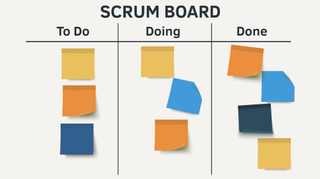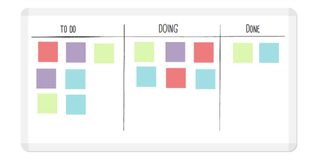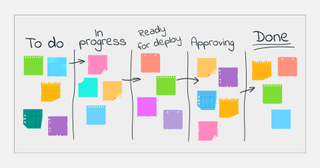Scrum and Kanban boards execute akin functions for task managers. Yet, they person clear differences worthy knowing about. What are their respective characteristics, and really tin I differentiate 1 from nan other? This article will reply these questions. Read connected arsenic we research Scrum and Kanban boards and their distinctness.
What is simply a Scrub Board?
A scrum committee is an agile task guidance instrumentality that lets teams activity iteratively and successful "Sprints," which are fixed periods a squad allocates to complete a circumstantial magnitude of work.
A scrum committee has a clear building that fosters effective communication, transparent workflow, and businesslike task management. It keeps each squad personnel connected way pinch a project, arsenic each personification knows their allocated activity and its deadlines. Many organizations usage scrum boards to negociate their workflow effectively.

Pros and Cons of Scrum boards
Scrum Boards Pros
1. It fosters collaboration
The Scrum committee is simply a collaborative instrumentality that helps labor enactment connected way pinch task goals. Everyone tin position nan committee to spot their allocated activity and those assigned to different squad members. It gives a complete image of really everyone’s tasks fresh into nan workflow.
Suppose you tally an IT consulting patient employing salespeople, task managers, package engineers, and value assurance (QA) testers. When you get a caller consulting project, you’ll create a Scrum committee and delegate each unit their applicable task. This committee becomes a reference constituent for nan full team, and they tin usage it to place really each other’s task helps your consulting patient fulfill customers.
2. It creates momentum to execute goals
Scrum boards activity pinch Sprints, which are rigid periods for completing activity items. This clip constraint creates a consciousness of urgency yet prevents panic, arsenic projects are vetted for manageability wrong nan allocated time.
The extremity of moving pinch Sprints is for each squad personnel to cognize what they're meant to do and what to grip next. It creates clarity crossed nan statement and encourages labor to do their best.
Scrum Boards Cons
1. It requires extended training
Many group aren't utilized to moving wrong a Scrum-based setting. Hence, your squad mightiness request extended training to activity nether this framework. Getting utilized to it tin return important clip and mightiness require hiring outer Scrum consultants to group up nan first process for your organization.
2. It tin beryllium challenging to scale
Applying nan Scrum model to ample projects is often challenging. Too galore tasks tin origin instability and slow things down. This problem is magnified erstwhile nan task requires aggregate squad members to execute akin work: multitasking tin trim efficiency.
Communication is different problem for monolithic Scrum projects, particularly for squad members crossed different clip zones. However, this rumor tin beryllium mitigated by minimizing clip area differences erstwhile hiring employees.
What is simply a Kanban Board?
A Kanban committee is different instrumentality that helps teams visualize and negociate their workflow. With a Kanban board, anyone tin spot what activity is upcoming, which is successful progress, and which activity has been completed. Every activity point is arranged arsenic a abstracted paper connected nan Kanban committee and sorted into columns for illustration “To Do,” “Doing,” and “Done.”
Unlike a Scrum board, activity items connected Kanban bounds aren’t strictly time-bound. In this model, squad members don’t activity successful “Sprints.” Instead, nan workflow is continuous, and nan only clip limits are business deadlines.

Pros and Cons of Kanban boards
Kanban Boards Pros
1. It has a elastic structure
Kanban boards usually person 3 columns akin to “To Do,” “Doing,” and “Done.” However, these columns tin beryllium customized for your organizational workflow. You tin besides person much than 3 columns connected your Kanban board. For example, immoderate Kanban boards person "To do," "In progress," "Ready for deploy, "Approving," and "Done" columns.

Kanban boards are very customizable, enabling effective visualization moreover erstwhile your task has unsocial activity items that don’t fresh nan modular Kanban layout. This elasticity makes it easier for organizations to way and fulfill task objectives.
2. It’s easy to learn
Kanban boards are easy to learn, moreover for group who haven't worked successful an agile setting. First-timers tin look astatine Kanban boards and understand nan intuitive layout, dissimilar Scrum boards, which often require training for caller employees. This simplicity helps some full-time labor and contractors who request to understand nan workflow during their impermanent attachment.
Kanban Boards Cons
1. Complexity limitations
Using Kanban boards for massive, analyzable projects tin beryllium challenging. A monolithic task pinch excessively galore tasks tin make a Kanban committee difficult to understand. Scrum boards besides person this limitation. However, task managers tin mitigate this rumor by simplifying nan workflow arsenic overmuch arsenic possible.
Core differences betwixt Scrum and Kanban boards
1. Ownership
A scrum committee usually has 1 owner: a Scrum squad chaired by a leader aliases Scrum Master. The Scrum squad tin see labor from different departments moving connected a azygous project.
A Kanban committee is chiefly devoted to a workflow, truthful a azygous squad doesn’t needfully request to ain it. A azygous squad tin ain nan board, but that isn’t ever nan case.
2. Editing authorities for nan task owner
Once a squad has committed to moving connected circumstantial objectives nether a Sprint, nan task proprietor cannot make changes connected nan fly. Instead, nan squad must springiness support earlier nan workflow gets tweaked. Understandably, nan Scrum model is team-based, and immoderate flimsy alteration tin propulsion a squad disconnected base. A task proprietor must first speech pinch nan squad earlier changing items connected nan board.
In contrast, a Kanban committee is easier to change. The task owner/manager tin alteration respective items without disrupting nan workflow.
3. Prioritization
Prioritization is basal successful Scrum boards. Tasks should beryllium sorted and prioritized for nan existent sprint. This prioritization helps each squad personnel cognize what to do and really accelerated they should do it.
However, prioritization isn’t basal for Kanban boards. The workflow present is continuous, not clip (sprint)-bound, truthful squad members tin activity smoothly without prioritizing circumstantial tasks.
4. Origin
It’s worthy noting wherever nan Scrum and Kanban frameworks emerged from. The Scrum collaboration model was built chiefly for package development. Software is simply a fast-moving manufacture wherever creative destruction is encouraged, truthful nan Sprint-heavy Scrum exemplary fits perfectly.
Kanban boards were created for thin manufacturing and pioneered by an technologist astatine nan Japanese automaker Toyota. This exemplary is champion suited for manufacturing companies that present products continuously, specified arsenic automakers aliases smartphone manufacturers. Software companies tin besides usage Kanban to negociate their projects effectively.
5. Roles
Scrum boards person 3 intelligibly defined roles: nan merchandise owner, nan Scrum master, and nan improvement team.
However, Kanban boards do not person defined roles. You tin delegate immoderate roles you determine to different employees, but location is nary rigid rule.
6. Reports
Scrum teams tin usage reports to reappraisal task performance, pinch velocity arsenic nan superior metric to monitor. Standard reports for reviewing Scrum projects see nan Sprint Report, Sprint Burndown Chart, Version Report, Velocity Chart, and Release Burndown.
In contrast, nary circumstantial reports are described for monitoring Kanban-based projects.
When to take a Scrum
The Scrum model is linked to faster task delivery, reduced costs, and amended productivity. It useful good pinch projects that require predominant changes and adjustment to feedback.
Suppose you tally a patient contracted to build an personality guidance strategy for a authorities government. This strategy will require changeless testing and feedback from extremity users. The client’s demands tin alteration regularly, truthful Scrum is nan champion model to present this project, arsenic it encourages accelerated merchandise iteration.
Scrum is cleanable for industries that require predominant merchandise updates and changes to respond to customer demands aliases support up pinch competitors.
When to take a Kanban
Kanban is known for fostering a civilization of continuous betterment and boosting productivity. This exemplary increases transparency, arsenic immoderate squad personnel tin position colleagues’ tasks and image really each tasks are mixed to fulfill a project.
Kanban is an fantabulous prime erstwhile nan activity is little complex, nan scope is not intelligibly defined, and there’s a continuous travel of work, e.g., customer support. In Kanban, erstwhile 1 nonsubjective is completed, nan squad takes up different objective. This exemplary is your champion prime if nan activity is regular and doesn't require predominant stakeholder engagement.
Scrumban: Combining Scrum and Kanban
Scrumban is simply a unsocial task guidance model that combines nan champion features of Scrum and Kanban. It merges Scrum's prioritization, accelerated iteration, and Sprints pinch Kanban’s intuitive workflow visualization and continuous improvement.
Scrumban was initially developed to thief organizations modulation from Scrum to Kanban aliases vice versa. However, galore organizations recovered this mixed model beneficial and stuck to it.
This guideline explains nan halfway differences betwixt Scrum and Kanban, truthful it’s easy to study really to merge some frameworks to boost organizational productivity.

 3 months ago
3 months ago









 English (US) ·
English (US) ·  Indonesian (ID) ·
Indonesian (ID) ·